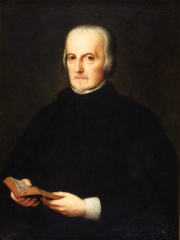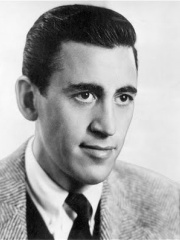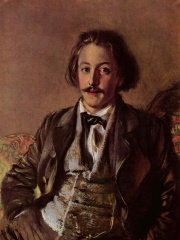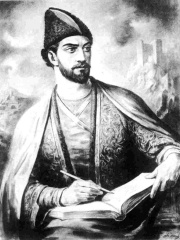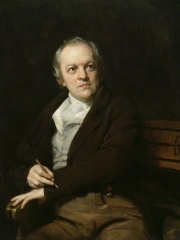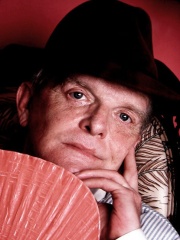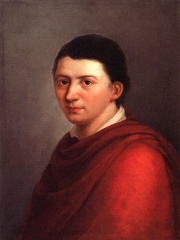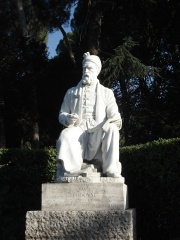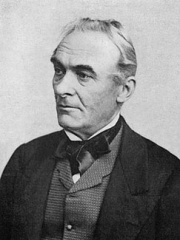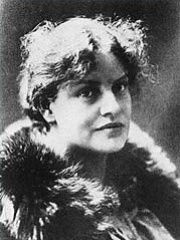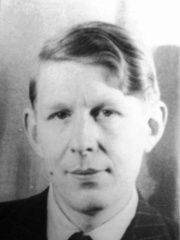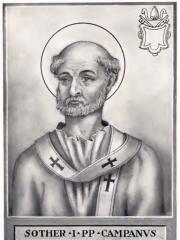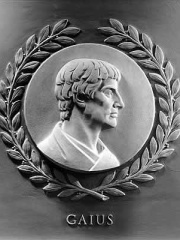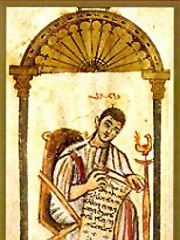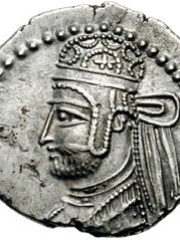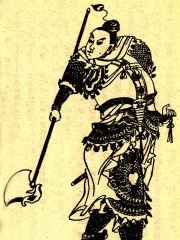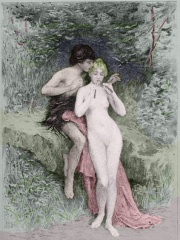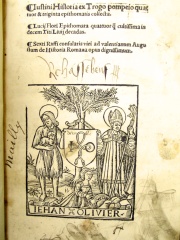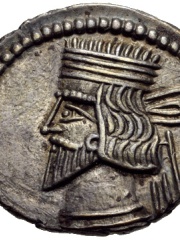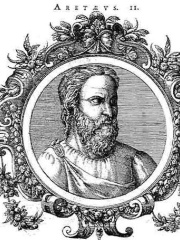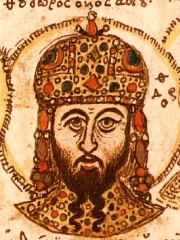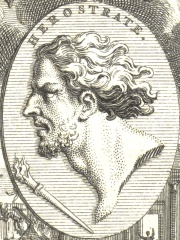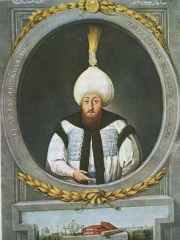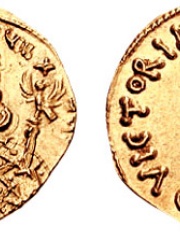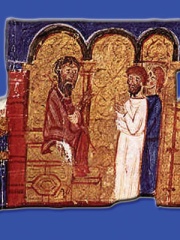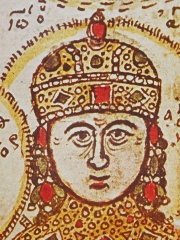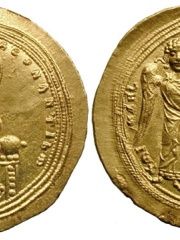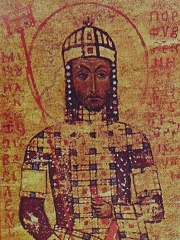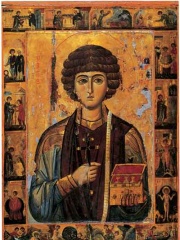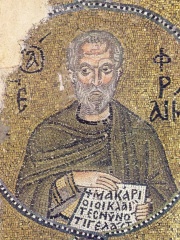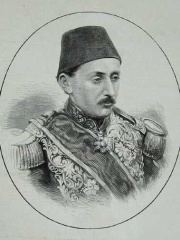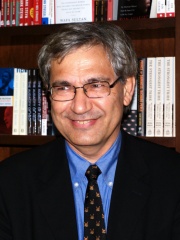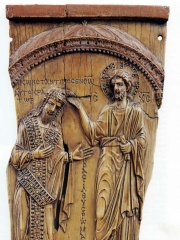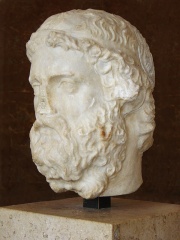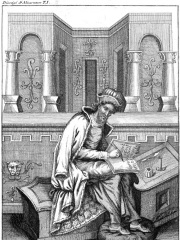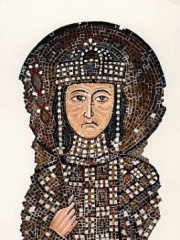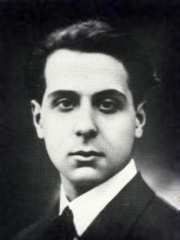Writer
Lucian
120 - 200
EN.WIKIPEDIA PAGE VIEWS (PV)
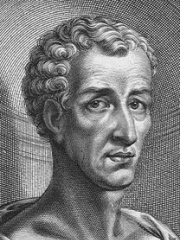
 Lucian
Lucian
His biography is available in 70 different languages on Wikipedia (up from 69 in 2024). Lucian is the 239th most popular writer (down from 161st in 2024), the 103rd most popular biography from Türkiye (down from 74th in 2019) and the 6th most popular Turkish Writer.
Lucian of Samosata was a Greek satirist and rhetorician who lived in the 2nd century AD. He is most famous for his satirical work, "The True History," which is a parody of the Greek historian, Herodotus.
Memorability Metrics
Page views of Lucian by language
Among Writers
Among writers, Lucian ranks 239 out of 7,302. Before him are Pedro Calderón de la Barca, J. D. Salinger, Paul Heyse, Shota Rustaveli, William Blake, and Truman Capote. After him are Friedrich Schlegel, Juvenal, Ferdowsi, Prosper Mérimée, Lou Andreas-Salomé, and W. H. Auden.
Most Popular Writers in Wikipedia
Go to all RankingsPedro Calderón de la Barca
1600 - 1681
HPI: 77.37
Rank: 233
J. D. Salinger
1919 - 2010
HPI: 77.30
Rank: 234
Paul Heyse
1830 - 1914
HPI: 77.29
Rank: 235
Shota Rustaveli
1172 - 1216
HPI: 77.21
Rank: 236
William Blake
1757 - 1827
HPI: 77.20
Rank: 237
Truman Capote
1924 - 1984
HPI: 77.19
Rank: 238
Lucian
120 - 200
HPI: 77.17
Rank: 239
Friedrich Schlegel
1772 - 1829
HPI: 77.16
Rank: 240
Juvenal
50 - 200
HPI: 77.14
Rank: 241
Ferdowsi
940 - 1020
HPI: 77.11
Rank: 242
Prosper Mérimée
1803 - 1870
HPI: 77.10
Rank: 243
Lou Andreas-Salomé
1861 - 1937
HPI: 77.10
Rank: 244
W. H. Auden
1907 - 1973
HPI: 77.00
Rank: 245
Contemporaries
Among people born in 120, Lucian ranks 2. Before him is Pope Soter. After him are Gaius, Tatian, and Parthamaspates of Parthia. Among people deceased in 200, Lucian ranks 1. After him are Juvenal, Sun Ce, Longus, Justin, Artemidorus, Emperor Chūai, Lucius Artorius Castus, Vologases III of Parthia, Aretaeus of Cappadocia, Soranus of Ephesus, and Babrius.
Others Born in 120
Go to all RankingsPope Soter
RELIGIOUS FIGURE
120 - 174
HPI: 77.60
Rank: 1
Lucian
WRITER
120 - 200
HPI: 77.17
Rank: 2
Gaius
LAWYER
120 - 180
HPI: 73.75
Rank: 3
Tatian
WRITER
120 - 180
HPI: 70.66
Rank: 4
Parthamaspates of Parthia
POLITICIAN
120 - 123
HPI: 59.69
Rank: 5
Others Deceased in 200
Go to all RankingsLucian
WRITER
120 - 200
HPI: 77.17
Rank: 1
Juvenal
WRITER
50 - 200
HPI: 77.14
Rank: 2
Sun Ce
MILITARY PERSONNEL
175 - 200
HPI: 71.59
Rank: 3
Longus
WRITER
110 - 200
HPI: 70.82
Rank: 4
Justin
HISTORIAN
110 - 200
HPI: 70.78
Rank: 5
Artemidorus
WRITER
200 - 200
HPI: 68.61
Rank: 6
Emperor Chūai
POLITICIAN
149 - 200
HPI: 67.37
Rank: 7
Lucius Artorius Castus
MILITARY PERSONNEL
200 - 200
HPI: 67.35
Rank: 8
Vologases III of Parthia
POLITICIAN
100 - 200
HPI: 66.90
Rank: 9
Aretaeus of Cappadocia
PHYSICIAN
100 - 200
HPI: 66.68
Rank: 10
Soranus of Ephesus
PHYSICIAN
98 - 200
HPI: 65.48
Rank: 11
Babrius
WRITER
110 - 200
HPI: 64.63
Rank: 12
In Türkiye
Among people born in Türkiye, Lucian ranks 103 out of NaN. Before him are Theodore II Laskaris (1221), Herostratus (-301), Mustafa III (1717), Philippikos Bardanes (700), Michael I Cerularius (1005), and Leo III the Isaurian (675). After him are John IV Laskaris (1250), Michael V Kalaphates (1015), Manuel I Komnenos (1118), Saint Pantaleon (275), Ephrem the Syrian (306), and Murad V (1840).
Others born in Türkiye
Go to all RankingsTheodore II Laskaris
POLITICIAN
1221 - 1258
HPI: 77.45
Rank: 97
Herostratus
EXTREMIST
301 BC - 356 BC
HPI: 77.45
Rank: 98
Mustafa III
POLITICIAN
1717 - 1773
HPI: 77.40
Rank: 99
Philippikos Bardanes
POLITICIAN
700 - 713
HPI: 77.33
Rank: 100
Michael I Cerularius
RELIGIOUS FIGURE
1005 - 1059
HPI: 77.21
Rank: 101
Leo III the Isaurian
POLITICIAN
675 - 741
HPI: 77.19
Rank: 102
Lucian
WRITER
120 - 200
HPI: 77.17
Rank: 103
John IV Laskaris
POLITICIAN
1250 - 1305
HPI: 77.16
Rank: 104
Michael V Kalaphates
POLITICIAN
1015 - 1042
HPI: 77.15
Rank: 105
Manuel I Komnenos
POLITICIAN
1118 - 1180
HPI: 77.12
Rank: 106
Saint Pantaleon
RELIGIOUS FIGURE
275 - 303
HPI: 77.11
Rank: 107
Ephrem the Syrian
RELIGIOUS FIGURE
306 - 373
HPI: 77.09
Rank: 108
Murad V
POLITICIAN
1840 - 1904
HPI: 77.08
Rank: 109
Among Writers In Türkiye
Among writers born in Türkiye, Lucian ranks 6. Before him are Hesiod (-800), Ammianus Marcellinus (330), Orhan Pamuk (1952), Constantine VII (905), and Anacreon (-570). After him are Dionysius of Halicarnassus (-60), Anna Komnene (1083), Giorgos Seferis (1900), Zosimus (460), Novatian (220), and Yunus Emre (1240).
Hesiod
800 BC - 700 BC
HPI: 86.72
Rank: 1
Ammianus Marcellinus
330 - 395
HPI: 80.61
Rank: 2
Orhan Pamuk
1952 - Present
HPI: 78.34
Rank: 3
Constantine VII
905 - 959
HPI: 77.72
Rank: 4
Anacreon
570 BC - 485 BC
HPI: 77.55
Rank: 5
Lucian
120 - 200
HPI: 77.17
Rank: 6
Dionysius of Halicarnassus
60 BC - 7 BC
HPI: 76.82
Rank: 7
Anna Komnene
1083 - 1153
HPI: 76.22
Rank: 8
Giorgos Seferis
1900 - 1971
HPI: 74.75
Rank: 9
Zosimus
460 - 520
HPI: 74.67
Rank: 10
Novatian
220 - 258
HPI: 72.46
Rank: 11
Yunus Emre
1240 - 1321
HPI: 72.13
Rank: 12
